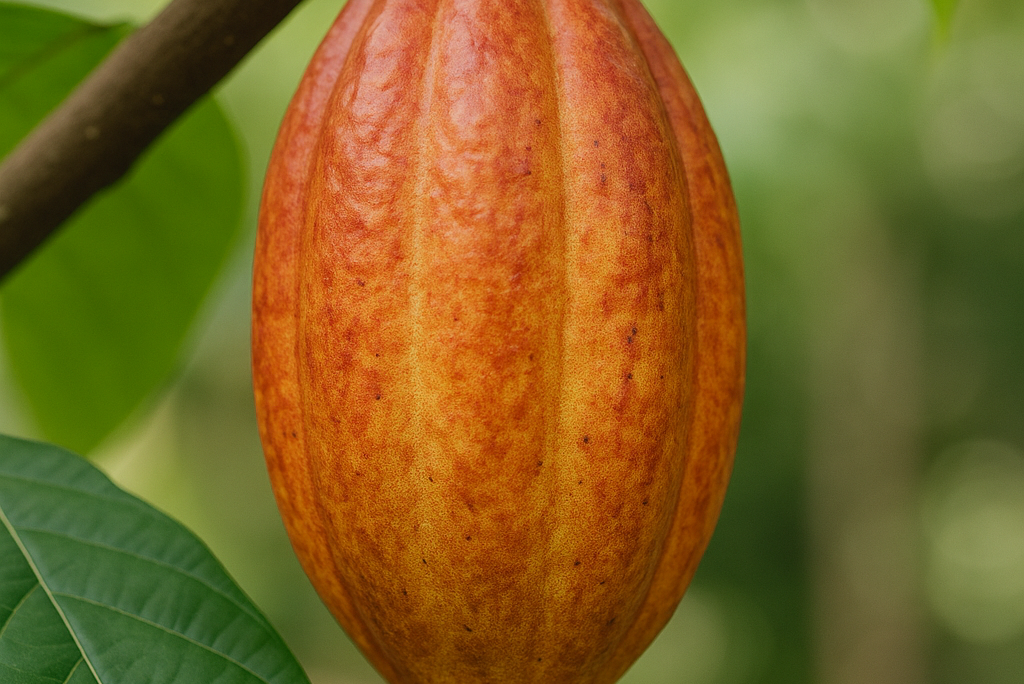In this article, we’ll take you on a journey to the cacao farms, where environmental stewardship, farmer well-being, and traceability come together to create a better kind of chocolate. From the way the cocoa is grown and harvested, to the care for communities and nature, our sourcing practices ensure that you can enjoy your chocolate with a clear conscience.
Caring for the Environment
Growing cocoa can either harm or help the environment – and we insist on the latter. Our cocoa is sourced from farms that prioritize environmental sustainability. This means working with nature, not against it. We partner with initiatives dedicated to ending deforestation and preserving biodiversity in cocoa-growing regionsksapa.orgksapa.org. For example, many of our farmers use agroforestry techniques: planting cocoa trees under the shade of existing forest canopies or among other trees. This approach protects rainforest ecosystems and wildlife while still producing high-quality cocoa beans. It also helps the soil stay healthy and resilient against climate changeksapa.org. By avoiding harmful practices – like clearing virgin forests or overusing chemicals – sustainable cocoa farming keeps local environments thriving for generations to come. We’re proud that every No Guilt Bar supports programs to replant trees, conserve water, and reduce the carbon footprint of chocolate production. It’s all part of treating the Earth with the same care that goes into our recipes.
Empowering Farmers and Communities
Ethical sourcing is also about people. We believe the farmers who grow our cocoa should earn a decent living and have safe, fair working conditions. To make this a reality, we only work with suppliers and cooperatives that uphold strict standards for labor and pay. In West Africa and other cocoa regions, it’s sadly common for farmers to struggle with poverty and even resort to child laborksapa.orgksapa.org. No Guilt Bars is determined to be part of the solution. We pay premium prices for cocoa beans, ensuring that farmers receive well above the typical market rate. In fact, some of our sourcing partners have documented paying farmers nearly double the percentage of the market price compared to the local average, directly boosting farmer incomes and quality of the cocoa beans improve. This extra income means families can afford better housing, healthcare, and education for their children. We also support community programs – from building schools to providing agricultural training – so that cocoa-growing villages can prosper. A key focus is keeping children in school and out of hazardous work; we align with organizations that actively monitor and combat child labor in cocoa communitiescargill.comcargill.com. By empowering farmers with fair earnings and resources, we’re not only doing what’s right – we’re also helping to grow better cocoa. When farmers have the knowledge and incentives to invest in their farms (like fermenting beans properly or planting disease-resistant trees), the flavor and quality of the cocoa beans. It’s a virtuous cycle: ethical practices lead to happier communities and superior chocolate.
Traceability and Trust
How can we be sure these standards are met? The answer is traceability. We maintain a transparent supply chain where every bag of cocoa can be traced back to the farmers who grew it. Using modern tools (like barcode tagging and digital ledgers), our partners track cocoa beans from the moment they’re harvested on the farm, through the cooperative or exporter, all the way to our chocolate kitchencargill.comcargill.com. This farm-to-bar traceability isn’t just a tech buzzword – it has real impacts. It gives us proof that our beans are coming from approved sources that meet our ethical criteria. It lets us quickly identify any issues (for instance, if a particular lot of cocoa didn’t meet our standards, we know exactly which farm it came from and can address it). Traceability also fosters trust: farmers see that their hard work is recognized and customers (like you) can feel confident about what you’re eating. Responsible chocolate companies around the world are embracing traceability because it holds everyone accountable and shines a light on practices that were once hidden in the supply chaincargill.com. For No Guilt Bars, traceability means we can guarantee that every cocoa bean in our chocolate was grown ethically, sustainably, and with care. It’s our way of keeping promises – both to our farmers and to you, our customers.
A Better Future in Every Bite
When you unwrap a No Guilt Bar, you’re not just treating yourself – you’re also supporting a better way of doing business in chocolate. We’ve seen firsthand how ethical sourcing can transform lives and landscapes. Farmers earn more and can invest in their futures. Children get the chance to go to school. Forests remain standing and cocoa is grown under the canopy of shade trees, protecting our planet’s lungs. And yes, all of this even makes the chocolate taste better – sustainable farming and careful post-harvest practices yield premium beans with richer flavor. Our commitment to responsible cocoa is ongoing. We continually work with local cooperatives, NGOs, and certification programs (like Fair Trade and Rainforest Alliance) to raise the bar for sustainabilityksapa.orgksapa.org. The journey is far from over, but we’re excited to be part of a positive change.
In every “no guilt” chocolate bar, there’s a story of respect – for nature, for farmers, and for quality. We hope when you taste our chocolate, you can feel the warmth and care that went into it, from the cocoa fields to your hands. Together, by choosing ethically crafted treats, we’re helping to shape a sweeter future for everyone involved. Enjoy each bite, guilt-free, knowing it’s doing good for you, and for the world that made it possible. cargill.com
